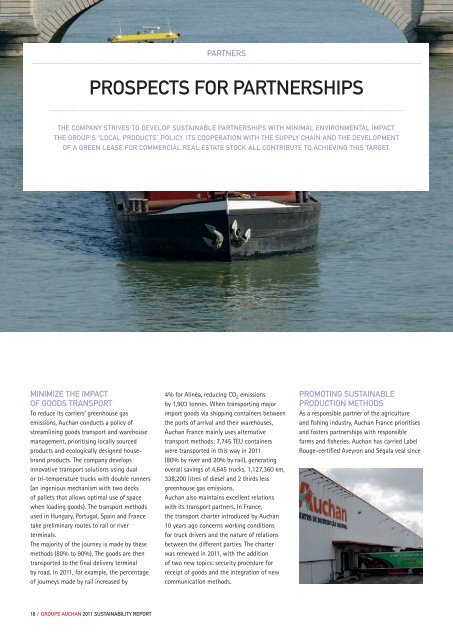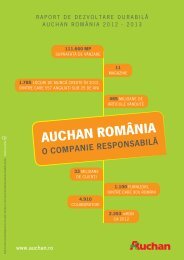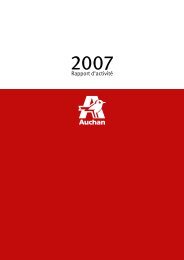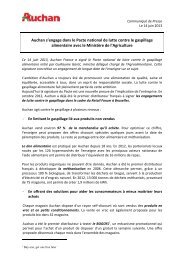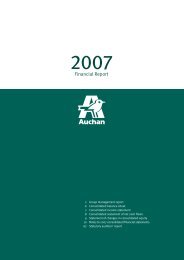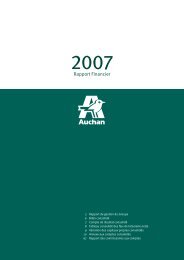Sustainable development report 2011 - Auchan . com
Sustainable development report 2011 - Auchan . com
Sustainable development report 2011 - Auchan . com
Create successful ePaper yourself
Turn your PDF publications into a flip-book with our unique Google optimized e-Paper software.
PARTNERSPROSPECTS FOR PARTNERSHIPSTHE COMPANY STRIVES TO DEVELOP SUSTAINABLE PARTNERSHIPS WITH MINIMAL ENVIRONMENTAL IMPACT.THE GROUP’S “LOCAL PRODUCTS” POLICY, ITS COOPERATION WITH THE SUPPLY CHAIN AND THE DEVELOPMENTOF A GREEN LEASE FOR COMMERCIAL REAL ESTATE STOCK ALL CONTRIBUTE TO ACHIEVING THIS TARGET.MINIMIZE THE IMPACTOF GOODS TRANSPORTTo reduce its carriers’ greenhouse gasemissions, <strong>Auchan</strong> conducts a policy ofstreamlining goods transport and warehousemanagement, prioritising locally sourcedproducts and ecologically designed housebrandproducts. The <strong>com</strong>pany developsinnovative transport solutions using dualor tri-temperature trucks with double runners(an ingenious mechanism with two decksof pallets that allows optimal use of spacewhen loading goods). The transport methodsused in Hungary, Portugal, Spain and Francetake preliminary routes to rail or riverterminals.The majority of the journey is made by thesemethods (80% to 90%). The goods are thentransported to the final delivery terminalby road. In <strong>2011</strong>, for example, the percentageof journeys made by rail increased by4% for Alinéa, reducing CO 2 emissionsby 1,903 tonnes. When transporting majorimport goods via shipping containers betweenthe ports of arrival and their warehouses,<strong>Auchan</strong> France mainly uses alternativetransport methods: 7,745 TEU containerswere transported in this way in <strong>2011</strong>(80% by river and 20% by rail), generatingoverall savings of 4,645 trucks, 1,127,360 km,338,200 litres of diesel and 2 thirds lessgreenhouse gas emissions.<strong>Auchan</strong> also maintains excellent relationswith its transport partners. In France,the transport charter introduced by <strong>Auchan</strong>10 years ago concerns working conditionsfor truck drivers and the nature of relationsbetween the different parties. The charterwas renewed in <strong>2011</strong>, with the additionof two new topics: security procedure forreceipt of goods and the integration of new<strong>com</strong>munication methods.PROMOTING SUSTAINABLEPRODUCTION METHODSAs a responsible partner of the agricultureand fishing industry, <strong>Auchan</strong> France prioritisesand fosters partnerships with responsiblefarms and fisheries. <strong>Auchan</strong> has carried LabelRouge-certified Aveyron and Ségala veal since1996. The 11,000 cattle sold each year areraised in farms that respect animal welfare,reclaim wood and invest in photovoltaicenergy.In Taiwan, sustainable pig farms ensure“Happy Pig” label certification. As a memberof the REAP (1) forum, the Group seeks to defineand disseminate its <strong>com</strong>mitments to progress,and endeavours to share good practices withprofessional networks in the sustainable retailsector. In <strong>2011</strong>, the Group produced a formaldefinition of its forest policy. It was supportedby the expertise of TFT (2) , an NGO withthe mission of tracking wood suppliesand supporting local <strong>com</strong>munities in obtainingFSC certification for their products. In 2012,<strong>Auchan</strong> decided to prioritise its projectto analyse its in-house paper consumptionand sales of paper and wood products (reamsof paper, toilet paper, paper towels, furniture),and to carry new green-label products.IMPROVING SHOPPING CENTRES’ENERGY PERFORMANCEPartner stores in shopping centres consume20% to 30% of the overall energy consumption.Immochan included an environmental clausein its business leases to associate partnerstores in an effort to improve overall energyefficiency. Factors such as energy, waterand waste management, carbon footprintreduction and environmental qualityimprovement in store fittings are nowaddressed when negotiating contracts.This environmental clause has been in forcein France since 2010 and has beenimplemented in Ukraine for its CityParkexpansion project. It has been re<strong>com</strong>mendedto partner <strong>com</strong>panies for three futureImmochan projects: Setúbal, in Portugal,Zenia, in Spain and Mestre, in Italy. In <strong>2011</strong>,106 of the 187 Immochan shopping centreshave implemented waste sorting systemsfor its partner stores. Specific trainingprogrammes are rolled out to storesand service providers in the NantesSaint-Sébastien shopping centre which,following the example of the Portugueseshopping centre Alegro Alfragide in 2010,has achieved a recycling rate above 60%,<strong>com</strong>pared with its previous rate of 20%.CLOSE-UPA LOCAL PRODUCTRANGEEach country carries a range of localproducts grown and/or produced nearstores, forging direct partnershipswith small-scale producers. In Russia,each store carries products from50 to 150 local suppliers. Turnoverfrom these products can represent upto 25% of the segment. <strong>Auchan</strong> Francecarries 4,000 local products, sourcedfrom about 1,000 different suppliers. Since 2010, these products have been identified withpromotional banners and shelf tags. Pages are dedicated to the subject in our salesbrochures, explaining the eco-friendly and qualitative benefits of these products.The short distance between the production site and the sales site minimises the products’carbon footprint. The local product range responds to increasing demand from locavoreconsumers who want to buy local specialities and contribute to local <strong>development</strong>. Alcamponow carries a new range called “Yo crio, yo produzco, yo fabrico*”, which uses an integratedproduction process, from the raw material through to the finished product. Such a systemcontributes to the independence and <strong>development</strong> of small-scale producers in remoteareas. With its “de la Tierra” fruit and vegetable range, Spanish supermarkets carryproduce grown in the Zaragoza and Logroño areas, delivered daily to stores and soldon the same day. The “Sabores de Portugal” brand name guarantees the geographicalsource of this range of Lusitanian products and uses only traditional local recipes.In China and Taiwan, direct sourcing is encouraged by governments and is also beingdeveloped for non-food cottage-industry products.* Literally: I raise, I produce, I manufacture.(1) Retailers’ Environmental Action Programme.(2) The Forest Trust.18 / GROUPE AUCHAN <strong>2011</strong> SUSTAINABILITY REPORT GROUPE AUCHAN <strong>2011</strong> SUSTAINABILITY REPORT / 19


